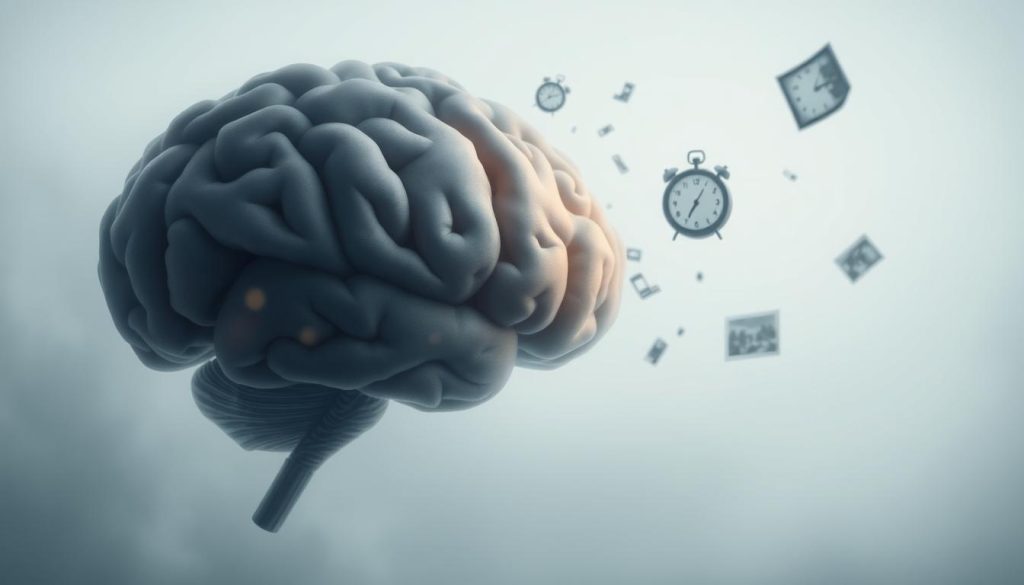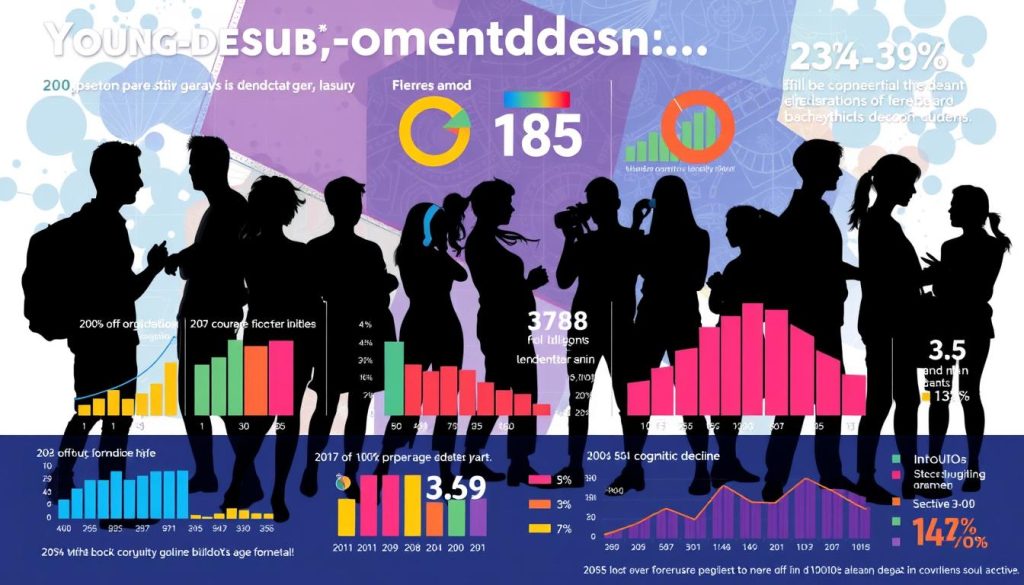Dementia is often seen as a disease of older age. But, there’s a growing concern about it appearing in younger people. This raises the question: can you get dementia in your? This is a time when people are usually at the peak of their careers and personal lives.
It’s important to understand that while rare, early-onset dementia can happen. It challenges the common belief that dementia only affects the elderly. We aim to shed light on this condition and clear up myths about memory loss in younger people.
This conversation is for those who might be worried about early-onset dementia. We want to offer clarity and support. Our goal is to debunk myths and provide helpful information for those facing the possibility of early cognitive decline.
Understanding Early-Onset Dementia
Early-onset dementia, also known as young-onset dementia, is diagnosed before age 65. It’s different from late-onset dementia, which happens after 65. People in their 30s may show dementia symptoms that need special attention.
Spotting the signs of early dementia is key. Young people might struggle with memory, planning, and mood changes. These issues are often seen as stress or too much work.
- Difficulty with visual and spatial abilities, such as struggling to comprehend distances, and differentiate colors and contrast.
- Impairment in executive functions, which affects the ability to plan, organize, and complete tasks.
- Inconsistencies in language, including finding the right words during conversations.
Young-onset dementia is not just a medical issue. It affects people in their prime, impacting work and family life. Getting diagnosed early changes everything, bringing new challenges.

Early detection of young-onset dementia changes treatment plans. It’s vital to catch dementia symptoms in 30s early. This can improve life quality and treatment outcomes for younger patients.
Knowing about these differences helps everyone involved. It makes it easier to support those with young-onset dementia.
Can You Get Dementia in Your 30s?
Many think dementia only happens to older people. But, new data shows it can start in your 30s too. This part looks into early cases and gives stats to clear up this big health issue.
Myths vs. Facts: The Reality of Young-Onset Dementia
Dementia can happen to younger adults, but it’s not as common as in older folks. Knowing the dementia risk factors in your 30s helps catch it early. A big myth is that all young-onset dementia is due to genes. But, lifestyle and environment also matter a lot.
Statistical Overview: Prevalence Among Younger Adults
Young-onset dementia is real, but it’s not as common as in older people. Studies say about 5% of dementia starts before 65. Looking at early-onset dementia cases gives us important info on cognitive decline in younger people.
| Age Group | Estimated Cases | Percentage of Early-Onset |
|---|---|---|
| 30-40 years | 425 | 1% |
| 41-50 years | 2,100 | 5% |
| 51-64 years | 40,000 | 94% |

Symptoms of Early-Onset Dementia in Your 30s
Finding dementia symptoms in 30s is hard, but spotting signs of early dementia early is key. This part talks about main signs that might show dementia in younger people.
- Memory lapses that disrupt daily life, such as forgetting recently learned information or important dates.
- Challenges in planning or solving problems, noticeable in difficulties following a familiar recipe or keeping track of monthly bills.
- Deterioration of the ability to complete familiar tasks at home, at work, or during leisure activities.
- Confusion with time or place, such as losing track of seasons and the passage of time.
- Trouble understanding visual images and spatial relationships, which can lead to difficulty driving.
- New problems with words in speaking or writing, such as trouble following or joining a conversation.
- Misplacing things and losing the ability to retrace steps, which may lead to accusations of others moving or stealing items.
- Decreased or poor judgment, evidenced by poor decision-making in personal care or financial matters.
- Withdrawal from work or social activities due to changes in the ability to hold or follow conversations.
- Changes in mood and personality, such as becoming confused, suspicious, depressed, fearful, or anxious.
These signs show a change from usual mental function and might mean signs of early dementia. If you or someone you know shows these signs, seeing a doctor is a good idea.
| Area Affected | Common Signs | Potential Impact |
|---|---|---|
| Memory | Forgetting important dates | Personal and professional disruption |
| Problem Solving | Difficulty with common tasks | Increased daily frustration |
| Time/Spatial Awareness | Confusion about location | Navigation difficulties |
| Communication | Trouble finding right words | Social withdrawal |
| Mood | Unexplained mood swings | Altered interactions |
What Causes Early-Onset Dementia?
To understand dementia in the 30s, we must look at genetics and lifestyle. This section will explain how these factors lead to early dementia.
Genetic Influences and Hereditary Factors
Genetic mutations and family history are key in early dementia. Some genes linked to Alzheimer’s can be passed down, raising risk in young adults. We’ll examine the impact of specific genes and family history on early dementia.
Lifestyle and Environmental Contributors
Lifestyle and environment also affect early dementia. Diet, exercise, and toxins are important. Changing these can lower dementia risk in younger people.
| Genetic Factor | Lifestyle/Environmental Factor | Impact on Early-Onset Dementia |
|---|---|---|
| PSEN1 gene mutation | Poor diet | Increases amyloid plaque formation |
| APOE e4 allele | Physical inactivity | Heightens neuronal damage |
| Family history of early-onset dementia | Exposure to heavy metals | Aggravates cognitive decline |
Diagnosing Dementia at a Young Age
Getting an early-onset dementia diagnosis needs a deep understanding of the medical process and the latest diagnostic tools. The steps can seem complex, but knowing each part is key for a quick and accurate diagnosis.
Navigating the Medical Evaluation Process
The first step is a detailed medical history and a thorough cognitive assessment by a healthcare expert. The goal is to learn about the patient’s symptoms, medical background, and family history of dementia.
The Role of Neuroimaging and Biomarkers in Diagnosis
New medical technologies have greatly improved early-onset dementia diagnosis. Neuroimaging, like MRI and PET scans, helps see the brain’s structure and function. It spots any signs of dementia. Biomarkers, proteins in blood or cerebrospinal fluid, also play a big role in early detection.
- Magnetic Resonance Imaging (MRI) – Provides detailed images of brain anatomy.
- Positron Emission Tomography (PET) – Helps in detecting the deposition of amyloid plaques, a hallmark of Alzheimer’s disease.
The journey to an early-onset dementia diagnosis is complex. It involves clinical checks, advanced imaging, and biomarker analysis. These steps give a full picture of the patient’s brain health.
Living with Dementia Symptoms in Your 30s
Living with early-onset dementia in your 30s is tough. It affects many parts of your life. This part talks about the everyday struggles and big changes in relationships and work.
Daily Challenges and Quality of Life
People with early-onset dementia face memory and problem-solving issues. Simple tasks become hard. To stay independent, using tools and reminders at home and work is key.
Impact on Family, Careers, and Relationships
Dementia affects more than just the person with it. It changes family life, work goals, and relationships. Family members might take on new roles without knowing how.
It also has a big financial hit. Medical costs go up, and income might drop. It’s important to keep emotional and social health strong, as isolation can happen.
| Aspect | Impact |
|---|---|
| Memory Loss | Affects job performance, daily activities |
| Social Withdrawal | Lowers interaction, possible isolation |
| Caregiver Stress | Increases burden on family and friends |
| Financial Strain | Elevates due to medical costs and possible loss of employment |
Dealing with early-onset dementia needs strong support and care plans. It’s not just about the medical side. It’s about how it affects the person’s life and those around them.
Signs of Early Dementia to Watch For
Spotting the signs of early dementia is key, even when symptoms start in the 30s. Look for any big changes in how you think or act. These should be different from what’s usual for you.
This guide aims to point out important signs of early dementia. If you or someone you care about shows these signs, see a doctor right away. They can check if dementia is starting.
- Memory loss that disrupts daily life
- Challenges in planning or solving problems
- Difficulty completing familiar tasks at home, at work or at leisure
- Confusion with time or place
- Trouble understanding visual images and spatial relationships
- New problems with words in speaking or writing
- Misplacing things and losing the ability to retrace steps
- Decreased or poor judgment
- Withdrawal from work or social activities
- Changes in mood and personality
These signs, and when they happen early, like in the 30s, are serious. Don’t ignore them.
| Sign of Dementia | Details | When to be concerned |
|---|---|---|
| Memory Loss | Forgetting recently learned information or important dates | If memory lapses are frequent and interfere with everyday life |
| Difficulty Solving Problems | Issues with making plans, working with numbers | When daily activities are compromised |
| Confusion with Time or Place | Losing track of dates, seasons and the passage of time | If disorientation occurs regularly |
| Withdrawal from Work/Social Activities | Avoiding hobbies, social activities, or work projects | When withdrawal is noticeable and impacts quality of life |
Managing Cognitive Decline in Your 30s
Managing early-onset dementia needs a full plan that includes medical help and big lifestyle changes. For those with cognitive decline in their 30s, it’s key to tackle both mental and physical sides of the issue.
Therapeutic Interventions and Lifestyle Modifications
Therapy is a big part of managing cognitive decline. It might include cognitive behavioral therapy and medicine from doctors. Also, making lifestyle changes every day is vital. Activities like exercise, eating well, and brain games can help slow down symptoms.
- Regular physical activities like walking or yoga
- Cognitive exercises such as puzzles and memory games
- Nutritional plans focused on brain health
Coping Strategies for Patients and Caregivers
Caregivers are key in managing early-onset dementia. It’s important for both patients and caregivers to find ways to deal with daily life. Support groups, talking to mental health experts, and a regular routine can help a lot.
- Joining support networks and groups
- Establishing a daily routine to limit confusion and stress
- Utilizing tools like reminder apps and calendars to manage daily tasks
When you’re in your 30s and facing cognitive decline, you need to be proactive. By using therapy and making lifestyle changes, you can live a good life despite the challenges.
The Emotional Toll of Young-Onset Dementia
Getting a dementia diagnosis at a young age can be very tough. People often feel shocked, angry, and sad. It’s hard to accept that their thinking skills might get worse sooner than expected.
Those diagnosed young worry about losing their future plans. They fear needing help from others. Depression, anxiety, and feeling alone are common as they try to come to terms with their new life.
| Emotional Response | Common Challenges |
|---|---|
| Denial | Accepting the diagnosis |
| Anger | Feeling a loss of control over life |
| Grief | Coping with the loss of future expectations |
| Depression | Social withdrawal and decreased motivation |
It’s important for those with young-onset dementia and their families to find emotional support. Getting help early and keeping up with mental health care is key. It helps manage the disease’s emotional effects and keeps life as good as possible.
Dementia Risk Factors in Your 30s: How to Protect Yourself
It’s important to know and tackle dementia risks in your 30s to avoid early-onset dementia. This part talks about key lifestyle changes to lower these risks.
Mitigating Risks Through Diet and Exercise
Eating right and staying active are key to fighting dementia risk factors in 30s. Foods full of antioxidants, healthy fats, and vitamins like leafy greens, berries, and fatty fish are good for your brain. Adding regular exercise, like cardio, strength training, and flexibility workouts, can also help a lot.
- Do at least 150 minutes of moderate aerobic activity each week.
- Make sure to do two or more days of muscle-strengthening activities.
- Try a Mediterranean diet with whole grains, fish, and healthy fats.
Understanding the Impact of Stress and Sleep
Managing stress and getting enough sleep are also key to lowering dementia risk factors in your 30s. Too much stress can hurt your brain, while good sleep helps your brain grow and remember things better.
- Stick to a 7-9 hour sleep schedule every night.
- Use mindfulness, yoga, or deep breathing to relax.
- See a doctor if stress or sleep problems keep you up at night.
Support Networks for Those Affected by Early-Onset Dementia
Living with early-onset dementia is tough, not just for the person but for their loved ones too. Many find help in early-onset dementia support groups. These groups offer important resources, emotional support, and practical tips for both patients and their families.
There are many ways to get help for young-onset dementia. Support groups, both in person and online, are great for sharing stories and tips. Counseling services also help people and families adjust to this new reality.
- Local support groups: Led by healthcare experts, these groups let people share their experiences and get advice from others who understand early-onset dementia.
- Online communities: Digital spaces help people connect, no matter where they are. They offer forums, social media groups, and websites for dementia support.
- Counseling services: Dementia care counselors help with emotional and mental challenges. They teach families how to cope and manage their mental health.
Support networks do more than just give information. They create a sense of community, helping to fight the loneliness of early-onset dementia. Through these groups, people find not just support but also the strength to face each day.
Advancements in Treatment Options for Young-Onset Dementia
Healthcare is making big strides in treating young-onset dementia. This brings hope and new ways to manage the condition. Doctors and researchers are working hard to find new treatments. They focus on both medicine and overall care.
Current Research and Future Therapies
New treatments for early-onset dementia are being developed. They use genetic understanding and biomarkers. This could lead to personalized medicine, helping younger patients more.
Recent breakthroughs include therapies to stop amyloid plaques in the brain. These plaques are thought to play a big role in dementia’s progression.
Beyond Medication: The Importance of Holistic Care
There’s also a growing focus on holistic care for early-onset dementia. This includes cognitive therapies, mental health support, and physical activities. Nutritional plans are also designed to help brain health.
These methods help patients stay independent and maintain a good quality of life. They show that care goes beyond just medicine.
Support from family, caregivers, and community resources is key in managing young-onset dementia. This shows that care is more than just medical treatment. With each year, the mix of new medicines and holistic care grows. It offers hope to those affected and their families.
Legal and Financial Planning for Early Dementia Patients
When someone gets early-onset dementia, it’s important to think about legal and financial plans. These plans help keep them safe and in control. With the right legal planning for dementia and financial advice for early-onset dementia, families can face the future with hope.
Navigating Disability and Health Insurance
Knowing about disability rights and health insurance can ease the financial stress of early dementia. It’s key to understand what benefits you might get. This includes looking into Social Security Disability Insurance (SSDI) and Medicaid for financial and health support.
Preparing for the Long-Term with Estate Planning
Estate planning is vital for those with early dementia. By setting up a durable power of attorney and a living will, you can make sure your wishes are followed. This planning also helps keep your finances stable and your loved ones secure.
It’s smart for patients and their families to talk to lawyers who know about elder law or disability rights. These experts can give advice that fits your situation. They can help make sense of legal documents and processes.
The Future of Early-Onset Dementia Care
Looking ahead, new ways to treat early-onset dementia are coming. These changes will make life better and care more tailored for younger patients. It’s a big step forward.
The heart of this progress is innovation in dementia care. It brings new treatments and early tests. These could change how we fight dementia, even for those who get it young. Technology is also playing a big role in tracking and managing the disease.
But it’s not just about the medicine. We’re also focusing on the emotional, social, and financial sides of dementia. The future looks bright for community support and professional care. It will meet the needs of those affected early in life.
| Aspect of Care | Current Innovations | Future Prospects |
|---|---|---|
| Diagnostic Tools | Genetic testing, Enhanced neuroimaging | AI-assisted diagnostic algorithms |
| Therapeutic Strategies | Targeted medications, Cognitive therapies | Personalized medicine, Non-invasive neuromodulation |
| Support Systems | Online communities, In-person support groups | Integrated community programs, Enhanced remote support technologies |
Using advanced tech like AI and IoT in care is a big change. It makes care more flexible and effective. These innovations in dementia care will not only help patients but also change how society views early-onset dementia.
Patient Stories: Living with Dementia in Their 30s
In the early stages of life, career, family, and growth are key. But, early-onset dementia changes everything. These stories show how people in their 30s face this challenge. They share their struggles and how they adapt.
People with early-onset dementia deal with losing their memory while trying to keep up with life. One woman was scared of losing her independence. But with help, she keeps doing what she loves and helps her community. These stories show how strong the human spirit is.
These stories highlight the impact of early-onset dementia on memory, identity, and relationships. They encourage us to understand and support those affected. They remind us of the need for empathy and hope for those living with dementia in their 30s.
FAQ
Q: Can you get dementia in your 30s?
A: Yes, it’s possible to get dementia in your 30s, though it’s rare. Most dementia cases happen in older adults. But, a small number of people get it when they’re younger.
Q: What is early-onset dementia?
A: Early-onset dementia is diagnosed before age 65. It’s the same as dementia in older adults but happens earlier. It brings unique challenges for those affected.
Q: What signs of early dementia should individuals in their 30s watch for?
A: Look out for memory loss that affects daily life. Also, trouble with familiar tasks and confusion about time or place. Other signs include problems with words, changes in mood, and withdrawal from activities.
Q: What causes early-onset dementia in the 30s?
A: Causes include genetic factors like certain Alzheimer’s mutations. Lifestyle and environmental factors like head trauma also play a role. Cardiovascular issues and medical conditions can contribute.
Q: How is dementia diagnosed at a young age?
A: Diagnosis involves a detailed medical check-up. This includes a medical history, physical exams, and cognitive tests. Neuroimaging and biomarker tests might also be used.
Q: What challenges do individuals with dementia symptoms in their 30s face?
A: They face challenges like symptom progression and career impact. It affects relationships and family life. Daily living becomes harder, and quality of life declines.
Q: Are there therapeutic interventions and lifestyle modifications for cognitive decline in the 30s?
A: Yes, treatments include medications and cognitive rehab. Lifestyle changes like diet, exercise, and social engagement help slow decline.
Q: What is the emotional toll of young-onset dementia?
A: A diagnosis can cause grief, anger, shock, and depression. It’s hard due to the loss of independence and impact on identity.
Q: How can individuals in their 30s protect themselves from dementia risk factors?
A: To reduce risk, eat well, exercise regularly, manage stress, and sleep well. Avoid smoking and alcohol, and keep your brain active.
Q: What support networks are available for those affected by early-onset dementia?
A: Support comes from family, friends, and groups. Professional counseling, online communities, and organizations like the Alzheimer’s Association are also available.
Q: What are the latest advancements in treatment options for young-onset dementia?
A: New medications and ongoing trials are underway. Gene therapies are being researched. There’s a focus on holistic care and lifestyle interventions.
Q: How do legal and financial planning change for early dementia patients?
A: Early planning is key. It includes securing benefits, health insurance, and setting up legal documents. Estate planning protects assets and ensures care wishes are met.
Q: What does the future hold for early-onset dementia care?
A: The future brings hope with new treatments and support services. Public perception and policies will also evolve to meet the needs of younger individuals.
Q: Can patients with dementia in their 30s lead fulfilling lives?
A: Yes, many find ways to adapt and continue meaningful activities. With the right support, they can maintain purpose and fulfillment.


















